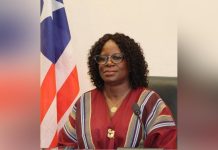Africa-Press – Liberia. GAC audit revealsA recent compliance audit by the General Auditing Commission (GAC) has exposed serious lapses in financial management, procurement irregularities, and potential misappropriation of public funds at the Liberia Telecommunications Authority (LTA) during the fiscal year 2023. The audit report uncovers glaring violations of Liberia’s Public Procurement and Concessions Act (PPC Act) and Public Financial Management (PFM) laws, raising concerns about how public resources are being handled within the LTA.
Shadowy deals
One of the most alarming findings in the audit centers on the LTA’s headquarters construction project, in which the report indicates that procurement laws were blatantly ignored. According to the audit, “there was no evidence of a bidding process initiated for the hiring of a project independent evaluator (HQ project technical supervisor).” Despite receiving recommendations from the Ministry of Public Works, the LTA bypassed the required competitive bidding process and unilaterally appointed a private evaluator, Hasan Al-Turabi Samura.
Even more concerning, the audit reveals that there was “no evidence of a procurement process conducted neither was there a contract entered into between the subsequently hired private evaluator and LTA.” Samura, hired without legal formalities, submitted an incomplete evaluation report that lacked technical details and pictorial evidence of the construction work performed. Yet, this report was used as justification to release a staggering $903,368 to Building Material Center Group Incorporated.
The audit calls into question the LTA’s adherence to the PPC Act of 2005, warning that “management may be non-compliant with the PPC Act… Value for money may be impaired. Public funds may be misappropriated.” The failure to follow procurement laws and ensure transparency in the headquarters project raises serious concerns about governance at the LTA.
Financial mismanagement at LDTP
Another shocking revelation from the audit involves the management of bank accounts linked to the Liberia Digital Transformation Project (LDTP). The audit notes that payments from the LDTP account were authorized by just one signatory, the Chairlady of the Board of Commissioners, rather than the required dual authorization. The report highlights that “copies of all returned checks received from the bank were observed to be signed exclusively by the then Chairlady.”
Even more troubling, the audit reveals that “payments were made without evidence of project initiation document, contracts, work plans, milestones, timeline, and liquidation reports,” indicating a complete disregard for basic financial accountability. Such lapses create an environment ripe for fraud and misappropriation of public funds.
The GAC audit strongly recommends that “management should immediately regularize the signatory mandate of the LDTP account and ensure that at least two signatories are required to authorize every transaction.” This step is critical in restoring transparency and accountability in the financial management of the LDTP.
A Black Hole of Accountability
The audit also uncovered major irregularities in the Liberia Digital Transformation Project itself, which involved payments to TAMMA Corporation and 231 Data Incorporated. The LTA made payments of US$450,000 and L$262,844,500 to the LDTP account, yet there was “no evidence of a contract signed under the LDTP with TAMMA Corporation and 231 Data Incorporated.”
TAMMA Corporation is headed by the Acting Chairman of the LTA, Mr. Abdullah Kamara; while 231 Data Incorporated is headed by Mr. Niahson K. Porte.
The audit further reveals that “there was no evidence of competitive recruitment of TAMMA Corporation and 231 Data Incorporated,” and that the companies’ activities under the project were not properly documented or evaluated. This lack of transparency not only violates the PPC Act but also raises concerns about whether public funds were used properly.
“I haven’t seen the report, so I can’t comment on it,” Porte told the Daily Observer. “I will say more when I get more information.”
In a particularly disturbing finding, TAMMA Corporation claimed it was instructed to transfer the project to the Ministry of Youth and Sports, but “evidence of such communication including turnover notes and lists of assets turnover were not made available by TAMMA Corporation.” This lack of documentation raises serious questions about the legitimacy of the project’s implementation and whether it was even completed.
The Daily Observer could not reach Kamara. We sent him a WhatsApp message with questions about TAMMA Corporation’s role in the Liberia Digital Transformation Project and are anticipating his response.
The audit calls for urgent reforms, recommending that “management should ensure that all contractors submit job completion certificates upon completion of deliverables and validate the deliverables before further payments are made to contractors.”
Millions in revenue unaccounted for
Perhaps the most financially damaging revelation from the audit involves the non-remittance of over US$3.8 million in accrued revenue due to the Government of Liberia (GoL) from the LTA. According to the report, the LTA collected US$9.38 million in revenue in 2023 but only transferred US$5.55 million to the GoL, leaving a shortfall of US$3.86 million.
The report warns that this non-remittance could have serious financial consequences for the government, stating that “non-remittance of GoL share of revenue collected may deny GoL of much-needed revenue. This may lead to misappropriation and misapplication of public funds.”
The audit recommends that “management should establish a ledger comprehensively cataloguing all remittances due to GoL, payments made to GoL, and outstanding balances.” Ensuring proper revenue-sharing mechanisms are in place is critical to restoring trust in the LTA’s financial practices.
Call for accountability
The findings of the Auditor General’s report paint a disturbing picture of the Liberia Telecommunications Authority’s governance and financial management. From ignoring procurement laws to failing to document and justify multi-million-dollar transactions, the LTA’s mismanagement poses a serious risk to public resources.
The audit concludes that “the subject matter is not in all material respect, in compliance with the 1986 Constitution of Liberia, the Public Financial Management (PFM) Act and Regulations of 2009… the PPC Act of 2005, as Amended and Restated 2010… and other relevant LTA Standard Operating Policies and Procedures.”
It remains to be seen what actions the Boakai administration will take in response to these violations, not only to restore public trust but also to prevent further loss of government revenue. Given the perennial plague of inefficiency and corruption in Liberia’s public sector, the LTA audit is a stark reminder of the magnitude of work to be done in ensuring transparency and accountability across government.
The LTA’s failures are emblematic of a much broader issue in Liberia’s public institutions — one where a lack of accountability, poor governance, and financial mismanagement are too often the norm. The GAC’s report serves as a wake-up call to not only the LTA but to the government which is desperately scraping for funds to meet its budgetary targets. Meanwhile, Liberians are agitating for better oversight of public resources, and calling for those responsible for such mismanagement to face justice.
Call it bureaucratic ineptitude or violation of public trust; it appears that, from the startling discoveries at the LTA, one could only imagine what GAC’s audits at other high revenue-generating agencies could reveal.
For More News And Analysis About Liberia Follow Africa-Press






